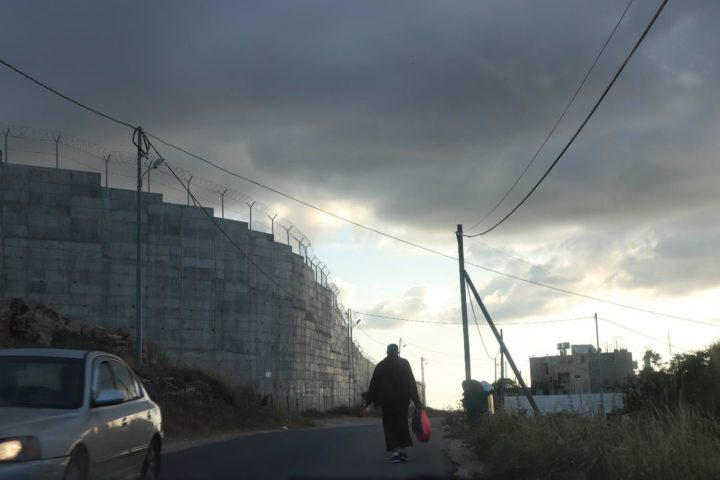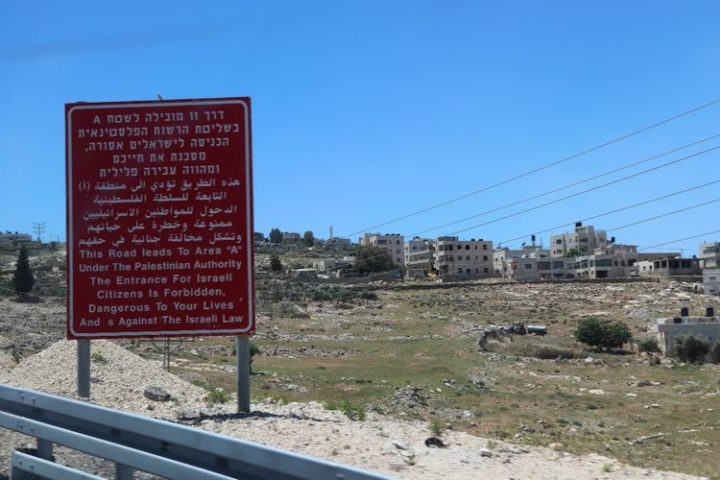For decades there has been an ongoing political conflict between Israel and the occupied Palestinian territories, its solution still seems to be far away. Can an open dialogue put an end to this tragedy? And how realistic is a dialogue between the citizens of both countries in the near future?
“You give me your look” is a youth book by Valérie Zenatti, which deals with the subject of an e-mail friendship between an Israeli girl and a Palestinian boy, in which both young people exchange information about their everyday lives, always with bombs on both sides , fear, violence and stereotypical images of the enemy.
They create open dialogue – a phenomenon that, unfortunately, could not yet be implemented in reality.
For over 20 years, Palestinians and Israelis have been divided by a 708 km long wall that was built by Israel, arguing that security measures must be limited in time to protect themselves from Palestinian attacks, but the wall still stands today and therefore represents one Political border that isolates 2500 Palestinians from the West Bank and makes the exchange of citizens of the two states almost impossible. This leads to the following question: “How can Palestinians and Israelis ever make peace if they never communicate with each other?”
Current debates
As part of the “Palestine exposition” in London (July 2019), Israeli journalist Gideon Levy, who likes to speak openly to Palestinians, argued that it was time for a new approach that Levy himself saw as the existence of a single state: Palestine.
He based his statement on the lack of democracy and justice in the Israeli government and said, “When we speak of the existence of a single state, we are talking about what may be the most important value in the world, namely justice, which unfortunately is still outstanding with us. There is no Israelis who regard a Palestinian as a completely equal individual “.
Levy appealed to the Isreal government at the same time: “You couldn’t have everything. You couldn’t occupy Palestinian territories and pretend to be united democracy in the Middle East and want to make peace if you do everything in your power to avoid any form of justice. »
However, what do Israelis think about the discussions about the existence of a single state? Levy emphasized that he is not interested in a dialogue with Israelis who support the State of Israel, as (as mentioned above) he is convinced that they don’t see Palestinians as equal and thus have no place in the conflict resolution.
Further rejections in a possible dialogue of the pro-Palastina camp occurred at the “Exist, Resist, Return-Palestine is the issue” event in London. When an Israeli gentleman who wished to remain anonymous, spoke up in a question and appealed for dialogue, the head of the discussion, Salim Alam, director of the West London Palestine Solidarity Campaign, dismissed a possible conversation in this case. The short dialogue took place as follows:
Israeli gentleman who wanted to remain anonymous: ‘I am firmly convinced that the Palestinian lobby and the mainstream of the Israeli community need dialogue, it is very easy to sit here in an audience like this, where everyone has the same opinion-but I don’t – but I am here and I think dialogue is important “.
Alam: “I’m ready to talk to everyone, no problem. But personally I just don’t want to talk to someone who is not for freedom, justice and equality. If someone does not recognize the illegal occupation of Israel, as well as the right of the Palestinian refugees to return to their homeland, then I would not like to deal with these people. ”
Biased attitudes.
Attempts to openly communicate outside the country’s borders therefore seem to have failed. A certain rejecting / distant attitude not only occurs in the Pro-Palastina camp, but can also be observed in the attitude of the supporters of the State of Israel.
Elliot Kleck, Communication officer at BICOM (British Israel Communications and Resarch Center) pointed out that the lack of focus on the Holocaust in the Palestinian educational system is a major obstacle to dialogue between the two countries.
Kleck added: “The idea of teaching the Holocaust is a big no-no, it seems that it justified Zionism. That is why the Holocaust is not taught in the Palestinian Authority, which is a big problem.”
A similar argument came from a teacher from Bethlehem, Palestine, who wanted to remain anonymous. He pointed out that the educational system in Israel does not encourage students to contact Palestinians under any circumstances and teaches them to build hatred towards the Palestinians.
In addition to the school system, the young teacher also mentioned the Israeli expression and language. The teacher: “When they discuss us (Palestinians) or the place where we live, they use the term” the other side “and not Palestine , or Palestinians. In Hebrew, they call the West Bank “Eshtakhim”, which means “the land”. So you pretend that Palestinians never lived on this land, as if we never existed. ”
However, these biased attitudes towards ideologies, education, and language usage are not the only problem or hurdle for open dialogue; the wall that separates the two states is undoubtedly one of the main problems, and the fact that both citizens cannot freely cross the borders.

The wall in Bethlehem. One wall, two perspectives – warning Israelis to use it as a protective measure, Palestinians speak of an “apartheid” wall photo by Cagla Bulut)
The wall, a major obstacle to open communication.
The West Jodanland, which is occupied by Israel, is divided into three areas: A, B and C. Area A is under Palestinian police and civil control, B under Israeli-Palestinian authority and Area C contains the Israeli settlement areas, which are under international control Law illegal, and is exclusively under Israeli control.
Israelis and Palestinians are not supposed to cross the borders and enter the other area. There are a few exceptions, such as work permits, visits to the doctor etc., but basically there is no place for encounters, space for exchange or other possibilities for interactive communication in the two countries.
An open dialogue within the states and the respective citizens is so important because it would offer space for questions and answers regarding the individual difficulties and the common suffering caused by the current circumstances. And ideally, this open communication would also bring a solution.
Even if biased attitudes are present on both sides, there are also many voices who are in favor of dialogue and who are in favor of a solution for both countries. The Palestinian teacher, who wished to remain anonymous, said in the interview that he had always been willing to engage in an open dialogue with Israel.
He has also been involved in various organizations and projects internationally, but he regrets that as soon as he returns home (Bethlehem), everything continues in the old tradition and no changes, let alone improvements, take place.
Doron Blumshtein, an Israeli engineer in Tel Aviv, emphasizes, like his predecessors in this article, that for dialogue to take place, something must first change in education. He is a great bearer of hope and promotes events and festivals for citizen on both sides and explains that he sees the solution not in politics and in politicians, but in artists, musicians, doctors, engineers and athletes.
Festivals and events could be the start of an exchange, especially if they are not primarily about politics and borders, but about things that citizens of both sides have in common and find amusing, such as art and entertainment.

Red sign announcing the start of Area A, which is under Palestinian authority. – Photo by Cagla Bulut)
An open dialogue does not have to take place at the political level, it does not have to deal with burning political debates or solutions to unresolved problems for decades. Effective dialogue between citizens can build bridges, build understanding on both sides, and pave the way for a more peaceful future together.
At the end of his interview, Blumshtein added hopefully: “We all wish for a better future for ourselves and our children. To be born on one side or the other is nothing more than a stupid coincidence. If you understand that, you become one stop swapping one side, but focus on a shared, better future. An open dialogue will certainly create a deeper bond between people on both sides.”
Apart from the large, gigantic, gray wall and biased attitudes, young people living in the two states in particular appeal for an open dialogue and agree to seek a common solution with the “other side”.
Decisions that directly affect palestina and israel have always been discussed and taken outside of the country’s borders, see here the 1993 Oslo Accord and the “ultimate deal” between Netanyahu and Trump 2020. In order to ensure peace in the two states, local politicians should in the future bring decision-making processes back to the country’s borders and try to start a dialogue with the “other side”. And who knows, maybe they should be open to new ways and leave the peace processes more to the younger generation in the future, because the old ways seem to be didn’t work.
Translated from German by Lultih V.










